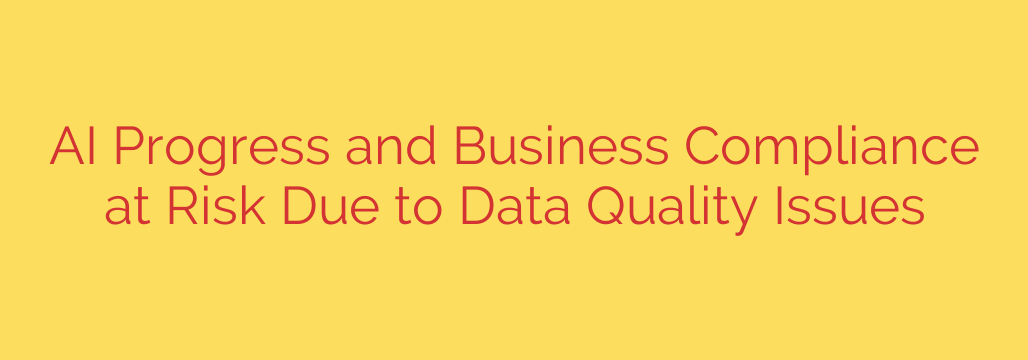
Is Bad Data Sabotaging Your AI? The Critical Link Between Data Quality and Business Success
Artificial intelligence, particularly generative AI, is poised to revolutionize industries. Businesses are rushing to implement AI solutions to gain a competitive edge, streamline operations, and unlock new revenue streams. However, a silent but significant threat is undermining these efforts from the inside: poor data quality.
Many organizations are discovering a harsh reality—their AI initiatives are stalling, not because the technology is flawed, but because the data fueling it is. This isn’t just a technical hurdle; it’s a critical business risk that can lead to failed projects, inaccurate insights, and serious compliance violations.
The “Garbage In, Garbage Out” Principle Magnified
The old adage “garbage in, garbage out” has never been more relevant. An AI model is only as intelligent, accurate, and unbiased as the data it’s trained on. When you feed an algorithm flawed information, you can’t expect reliable results.
Poor data quality manifests in several ways:
- Inaccurate Data: Information that is simply wrong, leading to flawed conclusions.
- Incomplete Data: Missing fields or entire records that create a skewed view of reality.
- Inconsistent Data: Contradictory information across different systems (e.g., a customer listed with different addresses).
- Outdated Data: Information that is no longer relevant and can lead to poor decision-making.
When AI models are built on this weak foundation, the consequences are severe. They may produce inaccurate predictions, generate nonsensical content, or fail to identify crucial patterns. This not only wastes significant investment in technology and talent but also erodes trust in AI systems across the organization.
From Flawed Models to Major Compliance Risks
The problem extends far beyond performance issues. In today’s regulatory landscape, data quality is directly linked to legal and ethical compliance. As regulations like GDPR and new frameworks like the EU’s AI Act take hold, businesses are under increasing pressure to ensure their AI systems are fair, transparent, and explainable.
Poor data quality makes compliance nearly impossible. If your training data is biased, your AI will inevitably produce biased outcomes, potentially leading to discriminatory practices in areas like hiring, lending, or customer service. This exposes your organization to significant legal penalties, reputational damage, and a loss of customer trust.
Regulators demand that companies can explain how their AI models arrive at a decision. Without clean, well-documented data, demonstrating this traceability is incredibly difficult. If you can’t prove the integrity of your data sources, you can’t defend the fairness or accuracy of your AI’s output, leaving your business vulnerable.
Actionable Steps to Build a Foundation of Trust
Protecting your AI investments and ensuring compliance requires a proactive approach to data management. Simply hoping your data is “good enough” is a recipe for failure. Instead, organizations must build a robust data quality strategy.
Here are essential steps to take:
Establish Strong Data Governance: This is the cornerstone of any successful data strategy. A clear governance framework defines who owns the data, establishes quality standards, and sets policies for how data is collected, stored, and used. It ensures accountability and consistency across the enterprise.
Implement a Data Quality Framework: Don’t wait until you’re ready to build a model. Implement continuous processes for data profiling, cleansing, and validation. Automated tools can help identify and rectify inaccuracies, duplicates, and incomplete records before they corrupt your AI systems.
Prioritize Data Lineage and Traceability: You must be able to trace your data from its origin to the point where it’s used by an AI model. This is critical for debugging issues, auditing results, and satisfying regulatory requirements for transparency.
Foster a Data-Centric Culture: Data quality is not just an IT problem; it’s everyone’s responsibility. Educate teams across all departments on the importance of maintaining high data standards and the direct impact it has on the company’s strategic goals.
Ultimately, data is the most critical asset in the age of AI. Treating it as a strategic priority is the only way to unlock the true potential of artificial intelligence, mitigate significant risks, and build a sustainable competitive advantage for the future.
Source: https://datacenternews.asia/story/data-quality-gaps-threaten-ai-progress-compliance-in-business








